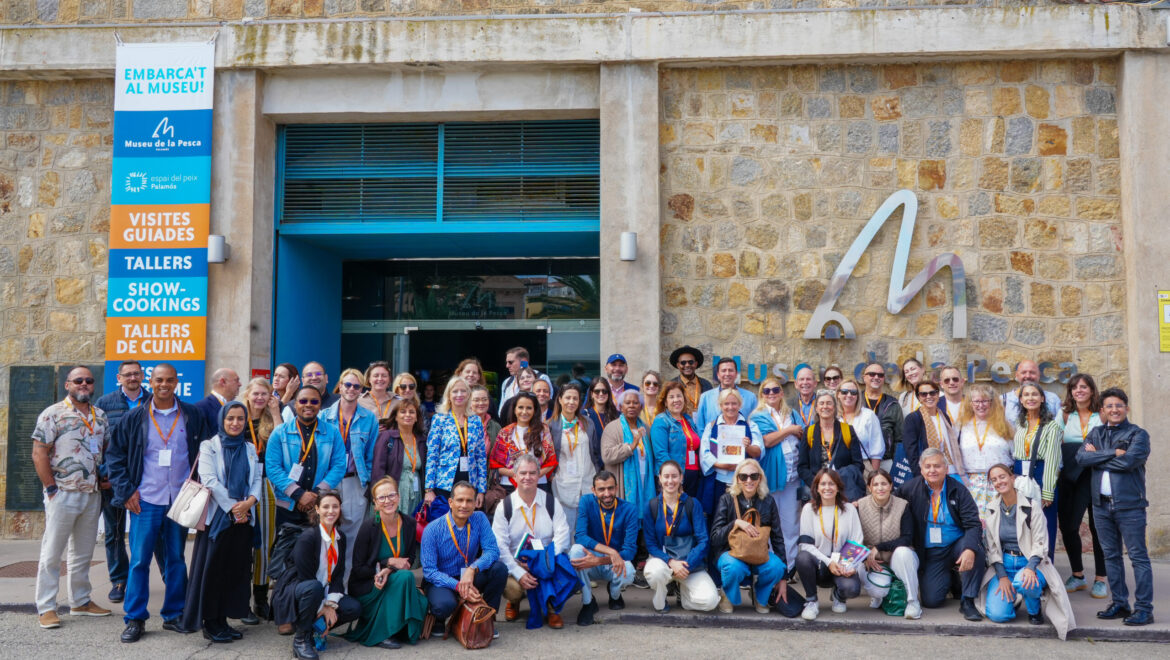Hosted by Catalonia, European Region of Gastronomy 2016 and World Region of Gastronomy 2025, the meeting offered an inspiring three-day programme combining field visits, conversations, and cultural encounters. Delegates explored how food and gastronomy can fuel creativity, foster education, regenerate ecosystems, and ensure well-being for all.
Day 1: Creativity and Innovation
The meeting began with a visit to elBulli1846, guided by Lluis Garcia, General Director of El Bulli Foundation, where participants discovered the legacy of Ferran Adrià and Juli Soler, and how elBullifoundation continues to nurture creativity and culinary innovation.
An official welcome followed at Celler La Vinyeta, where Dr. Diane Dodd, IGCAT President, Laura Ruana, Government of Catalonia, and Bea Nubiola, Catalan Tourism Board, greeted delegates and introduced them to the concept of “Som Gastronomia”. The evening continued with a dinner and tour of the winery, introduced by Josep Serra i Pla, highlighting La Vinyeta’s pioneering model of sustainability and circular farming.
Day 2: Educating and Imagining Our Food Future
The second day opened at the Palamós Fishing Museum, with a guided visit by Marta Rodeja, showcasing maritime heritage, sustainable fishing, and the Aula Blava project.
The first Conversation on Inspiring Spaces, moderated by Omar Valdez (Andorra), featured contributions from Francisco Guitard (First Coast nominated World Region of Gastronomy 2030, Florida), Károly Szabó (Harghita, European Region of Gastronomy 2027), Robert Oliver (Pacific Island Food Revolution, New Zealand), Prof. Vincenzo Russo (Sicily, European Region of Gastronomy 2025), and Ruqaya Al Habsi (Ministry of Heritage and Tourism, Oman).
At Celler Abadal, delegates enjoyed lunch and wine heritage guided by Marta Membrives, before engaging in the Conversation on Regenerative Tourism and Food Heritage, moderated by Wendy Barrie (Scottish Food Guide, UK). Speakers included Blanca Cros (Catalonia World Region of Gastronomy 2025), Votausi MacKenzie-Reur (Lapita Café, Regenerative Vanua, Vanuatu), Jaume Gomila (Menorca, European Region of Gastronomy 2022), Patricio Tamariz (Manabí World Region of Gastronomy 2026), and Sandra Bergsnev (Trondheim- Trøndelag, European Region of Gastronomy 2022).
The day concluded with a visit to the Monastery of Sant Benet, where history, gastronomy, and innovation converge.
Day 3: Good Food for Everyone
The final day began at the Alícia Foundation, guided by Toni Massanés, where participants learned about advances in food innovation, health, and inclusivity.
The Conversation on Good Food for Everyone, moderated by Ivana Vladović (Split Dalmatia Tourist Board, Central Dalmatia European Region of Gastronomy 2026), brought together perspectives from Laura Ruana Pavon (Catalonia World Region of Gastronomy 2025), Vasia Papailia (South Aegean European Region of Gastronomy 2019), Chef Randie Anderson (Culinary Concepts and Solutions Ltd., Jamaica), Oscar Ekponimo (Chowberry Foundation, Nigeria), and Per Theodor Tørrissen (Nordland, candidate European Region of Gastronomy 2028).
Delegates then visited El Soler de n’Hug Farm, where they experienced sustainable livestock practices, before learning about Welcome to the Farm (Benvinguts a Pagès). Presented by Bea Nubiola (Catalonia World Region of Gastronomy 2025 Tourism Coordinator) and Montserrat Costafreda (Prodeca), the initiative connects citizens with local producers, reinforcing the vital link between food, farmers, and communities.
The meeting closed with a Lessons Learnt session led by Mayada Badr (Aseer, World Region of Gastronomy 2024), Orazio Bellettini (Manabí, World Region of Gastronomy 2026), and Jerry Spooner (Vanuatu, candidate World Region of Gastronomy 2027), followed by a final dinner at Can Calopa, an urban winery and social project in Barcelona, where closing remarks were given by Bea Nubiola, Laura Ruana Pavón, and Jaume Gomila (IGCAT Vice President).
The 30th Platform Meeting reaffirmed the importance of learning exchanges and immersive experiences in shaping a shared vision for sustainable food futures. Catalonia’s thoughtful programme demonstrated how gastronomy can serve as a tool for creativity, education, community regeneration, and inclusivity, inspiring regions worldwide to innovate while honouring their cultural and natural heritage.
About the World/European Regions of Gastronomy
World/European Regions of Gastronomy, guided by IGCAT, are working together to strengthen food security through the celebration of distinctive food cultures; create employment by stimulating creativity and gastronomic innovation; nourish children and adults through culinary and cultural education; driving environmental sustainability in tourism, hospitality and agricultural sectors; supporting balance and sustainable tourism practices; highlighting and supporting expertise from within rural and urban communities, creating connections and sharing good practices; and contributing to community health and well-being.
About IGCAT
IGCAT aims to empower local communities by raising awareness of the importance of protecting and promoting distinct regional food, culture, arts and natural assets as part of sustainable and balanced tourism and development strategies. This is essential to safeguarding our planet, health, wellness and local economies.
IGCAT is a non-profit institute established in 2012, working with regional stakeholder consortiums in the fields of gastronomy, culture, arts and tourism. It counts on the expertise of a worldwide network of experts and works in partnership with specialised intergovernmental organisations.
IGCAT founded the World/European Region of Gastronomy Award and is the official secretariat for the World/European Regions of Gastronomy Platforms. Furthermore, the Institute has developed the European Young Chef Award, the World Food Gift Challenge, the Top Websites for Foodie Travelers Award and the international Food Film Menu.

